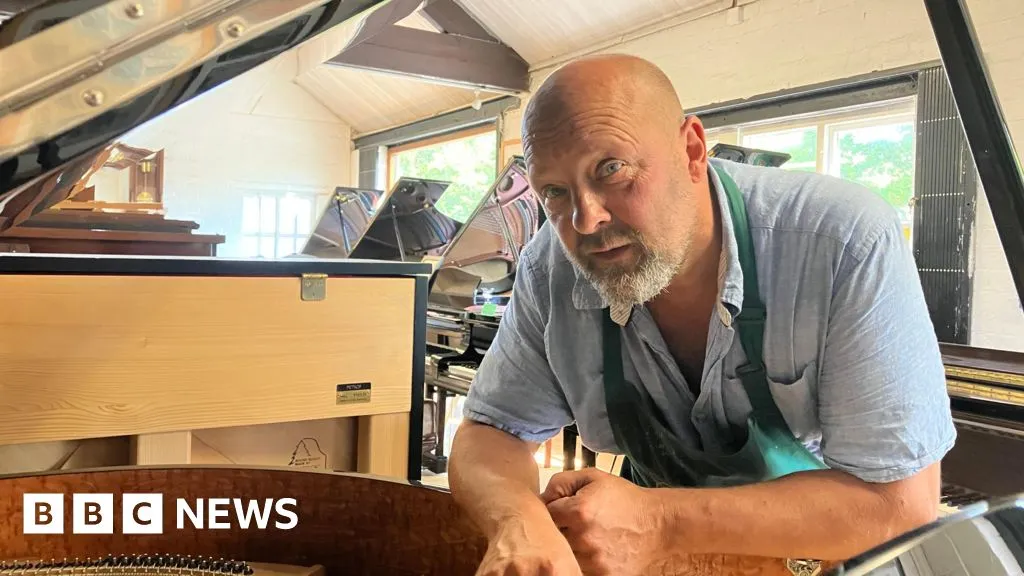Amid the sound of birdsong and cattle grazing in the fields of the Yorkshire Dales, there is a more unexpected sound.
The tinkling of piano keys can be heard from a single-storey workshop.
It is home to the last piano makers in the UK.
The skill has been placed on the Heritage Crafts charity's red list, which ranks traditional crafts by their likelihood of surviving into the next generation.
While piano building may be deemed among the most endangered, Yorkshire Pianos owner Adam Cox insists it is by no means a dying art.
"Sometimes we'll get called the last piano manufacturer which sounds a bit sad, like you're the last Siberian tiger and it's only a matter of time until you drop dead," he says.
Tucked away in the countryside between Harrogate and Skipton, the Yorkshire Pianos site also houses the workshop where the Cavendish piano is made - the type to be wholly built in the UK.
Inside the workshop, gleaming rows of polished pianos are packed in closely together.
Adam, who has been involved in the restoration and sale of pianos since the 1990s, learned to play the instrument as a child.
However, he remembers always being interested in "what was going on beneath the bonnet".
It was the 2009 closure of the Kemble piano factory near Bletchley that inspired him to open his own workshop.
"I think there's a feeling that heritage crafts belong in museums and they're not relevant to today - but some, like building pianos, are just as relevant as they've ever been," he says.
"Pianos are still used daily - they're used in hip-hop music, they're used in pop, jazz and classical of course."
Adam employs six people and works with other craftspeople who produce different parts of the instrument, including a cabinet maker from Otley and fabric manufacturers, Hainsworth, in Leeds.
The elements are then assembled at the back of the showroom, in a skilled process that can take up to six months to complete.
The workshop itself offers a glimpse of the delicate craftmanship it takes to build a piano - specialist tools line the walls and two half-finished pianos expose a complicated internal network of strings and hammers.
For Adam, building a piano is "the closest you can get to real magic".
"You're taking bits of wood and metal, sheep's wool, felt and if you put them together in exactly the right sort of way, it's like alchemy, you get a beautiful, singing instrument," he says.
"To make music and musical instruments is such a beautiful thing, I think it's incredibly important to keep the knowledge alive."
Learning the required skills can take years, which makes it difficult to scale up and employ more people, according to Adam.
He believes working in heritage crafts represents the kind of job a person spends their life perfecting - which he says does not align with a modern career pattern.
"That's it is so important to have young people working with us, to carry on this tradition, not just for tradition's sake," he adds.
Adam Connolly started working at Yorkshire Pianos when he was 19, bringing a knowledge of woodwork - but not of piano making.
Now 34, he has been involved in the restoration and manufacture of pianos for the past 15 years and still finds it "enjoyable" to see a project from start to finish.
"It's very important to keep it going," he says.
"There used to be so many piano builders back in the day, at one point there were well over 100 in London alone.
"They all fizzled out, and with it being quite niche we've just got to try and keep it going - and have fun while doing it."
While he enjoys the craftmanship, he admits with a rueful smile that he has still not learned to play the piano himself.
Mary Lewis, from the Heritage Crafts charity, says without the knowledge being passed on, there is "a serious risk that the craft will not survive into the next generation".
"It is a complicated and highly skilled craft that relies on a wide range of hand skills and knowledge to produce objects that both look and sound beautiful," she says.
Related crafts, including piano tuning and restoration, are practiced by more people, Ms Lewis says, adding that without pianos being made these skills could also be at risk.
"If we don't actively support these master craftspeople, the music of the future may sound quite different," she adds.
However just because piano building is classed as a traditional craft, does not mean that it has to be stuck in the past, says Adam.
He says he is looking at ways the firm can innovate and develop in the future.
"We're a small set up so we're very well placed to do research and development because each piano is individually made, they're not going down an assembly line," he adds.
"We prefer to call ourselves the first of a new age of piano building,we're not a dead craft by any means."
"The importance of it is immense;it's a very intricate and specialised skill that can only be passed on like a language from person to person."
